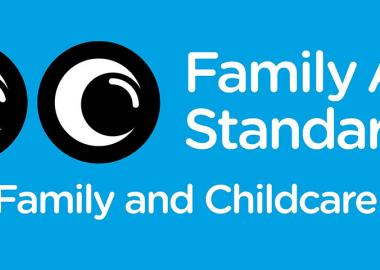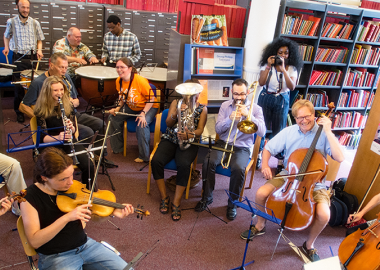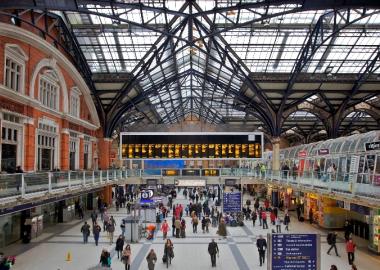There is a well documented drop off in young people’s involvement in music making aged 18 when they leave the formal education system. Collaborations with Music Education Hubs could be one way to prevent some of this drop off.
Content:
- What is a Music Education Hub?
- Why is this relevant to Making Music member groups?
- What could a partnership look like in practice? (case studies)
- Next steps
What is a Music Education Hub (MEH)?
Music Education Hubs were established in 2012, funded by Arts Council England. Each hub consists of a group of local organisations engaged with music education of children up to the age of 18. These organisations could include music services, schools, community groups and arts organisations, and there is a lead organisation for each hub. There are 123 Music Education Hubs in England.
Each hub’s core remit, taken from the National Plan for Music Education (in England), is to:
- Ensure that every child aged 5 to 18 has the opportunity to learn a musical instrument (other than voice) through whole-class ensemble teaching programmes for ideally a year (but for a minimum of a term) of weekly tuition on the same instrument
- Provide opportunities to play in ensembles and perform from an early stage
- Ensure that clear progression routes are available and affordable to all young people
- Develop a singing strategy to ensure that every pupil is singing regularly and that choirs and other vocal ensembles are available in the area
In addition to this there are a number of extension roles, one of which is to:
- Provide access to large scale and/or high quality music experiences for pupils, working with professional musicians and/or venues. This may include undertaking work to publicise the opportunities available to schools, parents/carers and students
In Scotland, Wales and Northern Ireland, rather than through a partnership such as the music education hubs represent, young people’s music education is still largely delivered by music services run by local authorities.
Why is this relevant to Making Music member groups?
Although most Making Music member groups don’t work exclusively with 5-18 year olds, there are a number of interesting crossover points. Partnerships take time and investment to develop, but there are some good arguments on both sides as to why this is a worthwhile undertaking.
- Young people reach the age of 18 and can no longer sing or play with their youth orchestras and choirs. They’re not always sure where to look for a new group to join, and often are unaware of the existence of adult music groups in the community ‘for fun’. A partnership between local music groups and their MEH could signpost help young people to post-18 opportunities in their community, and help MEHs with their remit of ensuring progression routes.
- Also on the topic of clear progression routes for young people: what happens if a young person is very talented in a particular instrument, but a MEH doesn’t have an advanced group that caters for that instrument? Or a young person really wants to play in a brass band, but that MEH doesn’t have a brass group. Rather than a MEH having to directly provide opportunities to young people, they could facilitate some young people being placed in local music groups that can cater for that specialism.
- A partnership between local music groups and a MEH could help to create rich musical communities. For example, a MEH could signpost the parents of students to local music groups. If a parent at home is rehearsing for a concert with their local orchestra, they will be modelling good practice to the child who is learning an instrument, and inspiring their child in turn to practice their instrument and improve as a learner.
- One of MEH’s extension roles is to provide access to large scale or high quality musical experiences. Perhaps local music groups are working with professional artists for a particular concert. Perhaps there could be opportunities for joint performances.
What could a partnership look like in practice? (cases studies)
Making Music and Bromley Youth Music Trust (BYMT) have been working closely to explore how hubs and music groups can work more closely in practice. BYMT hosted a partnership meeting for Making Music members, which has led to the creation of a local network whereby local members and BYMT can share details of their groups and upcoming concerts, and mutually promoting each other. BYMT has invited local groups to exhibit at their alumni concert, in order to paint a picture of the range and diversity of musical activities in the borough.
Lewisham’s Music Hub, Lewisham Music, collaborates with adult brass band Crystal Palace Progress Band every Christmas. The Lewisham Schools Brass Band, run by the hub, performs in a joint concert alongside Crystal Palace Progress Band. This not only enables the students to perform alongside adults to a sell-out crowd, but also ensures that all the young people taking part are very definitely aware of an adult brass band in their local area. Even if the young people were to move away from the area once they turn 18, the awareness of the existence of adult groups ‘for fun’ might lead them to me more likely to seek one out in the future.
Djanogly Community Orchestra stepped out of their comfort zone and worked with their local local Music Education Hub, bringing musical enjoyment to people of all ages in the community. School children played alongside adults in an orchestra formed for performances organised by the Hub. Read the full case study about Djanogly Community Orchestra.
Wolverhampton Symphony Orchestra worked with the Wolverhampton Youth Orchestra via their Music Hub to collaborate on multiple musical ventures, including joint daytime concerts and enabling Year 7 pupils the opportunity to access an orchestral concert free of charge. Read the full case study.
Next stepsLike schools, music services or hubs are often stretched with regard to capacity as well as funding. So it’s important to bear in mind that you may have to be proactive in your approach to creating a relationship. You can contact your music service or MEH directly. In England, Music Mark is the membership organisation for Music Education Hubs, and details of how to find and contact your local hub can be found on their website. Before approaching your music service or hub, make sure that you:
5 Takeaways1) Connecting with your Music Education Hub (MEH) will allow you to raise awareness about your music group. |
We hope you find this Making Music resource useful. If you have any comments or suggestions about the guidance please contact us. Whilst every effort is made to ensure that the content of this guidance is accurate and up to date, Making Music do not warrant, nor accept any liability or responsibility for the completeness or accuracy of the content, or for any loss which may arise from reliance on the information contained in it.










